- Home
- STEVE MARTIN
Born Standing Up: A Comic's Life
Born Standing Up: A Comic's Life Read online
Also by Steve Martin
NOVELS
The Pleasure of My Company
Shopgirl
PLAYS
Picasso at the Lapin Agile
WASP
NONFICTION
Pure Drivel
Cruel Shoes
SCREENPLAYS
Shopgirl
Bowfinger
L.A. Story
Roxanne
The Jerk (coauthor)
Scribner
A Division of Simon & Schuster, Inc.
1230 Avenue of the Americas
New York, NY 10020
Copyright © 2007 by 40 Share Productions, Inc.
All rights reserved, including the right to reproduce this book or portions thereof in any form whatsoever. For information address Scribner Subsidiary Rights Department,
1230 Avenue of the Americas, New York, NY 10020.
Scribner and design are trademarks of
Macmillan Library Reference USA, Inc., used under license by Simon & Schuster, the publisher of this work.
Library of Congress Cataloging-in-Publication Data
Martin, Steve, 1945–
Born standing up: a comic’s life/by Steve Martin.
p.cm.
1. Martin, Steve, 1945–2. Entertainers—United States—Biography.
I. Title.
PN2287.M522A3 2007
792.7'028092—dc22
[B]
2007027143
ISBN-13: 978-1-4165-6974-9
ISBN-10: 1-4165-6974-X
Photograph credits appear on last page.
Visit us on the World Wide Web:
http://www.SimonSays.com
To my father, mother,
and sister, Melinda
Contents
Beforehand
Coffee and Confusion
Comedy Through the Airwaves
Disneyland
The Bird Cage Theatre
Television
The Road
Breakthrough
Standing Down
Acknowledgments
Born Standing Up
Beforehand
I DID STAND-UP COMEDY for eighteen years. Ten of those years were spent learning, four years were spent refining, and four were spent in wild success. My most persistent memory of stand-up is of my mouth being in the present and my mind being in the future: the mouth speaking the line, the body delivering the gesture, while the mind looks back, observing, analyzing, judging, worrying, and then deciding when and what to say next. Enjoyment while performing was rare—enjoyment would have been an indulgent loss of focus that comedy cannot afford. After the shows, however, I experienced long hours of elation or misery depending on how the show went, because doing comedy alone onstage is the ego’s last stand.
My decade is the seventies, with several years extending on either side. Though my general recall of the period is precise, my memory of specific shows is faint. I stood onstage, blinded by lights, looking into blackness, which made every place the same. Darkness is essential: If light is thrown on the audience, they don’t laugh; I might as well have told them to sit still and be quiet. The audience necessarily remained a thing unseen except for a few front rows, where one sourpuss could send me into panic and desperation. The comedian’s slang for a successful show is “I murdered them,” which I’m sure came about because you finally realize that the audience is capable of murdering you.
Stand-up is seldom performed in ideal circumstances. Comedy’s enemy is distraction, and rarely do comedians get a pristine performing environment. I worried about the sound system, ambient noise, hecklers, drunks, lighting, sudden clangs, latecomers, and loud talkers, not to mention the nagging concern “Is this funny?” Yet the seedier the circumstances, the funnier one can be. I suppose these worries keep the mind sharp and the senses active. I can remember instantly retiming a punch line to fit around the crash of a dropped glass of wine, or raising my voice to cover a patron’s ill-timed sneeze, seemingly microseconds before the interruption happened.
I was seeking comic originality, and fame fell on me as a by-product. The course was more plodding than heroic: I did not strive valiantly against doubters but took incre mental steps studded with a few intuitive leaps. I was not naturally talented—I didn’t sing, dance, or act—though working around that minor detail made me inventive. I was not self-destructive, though I almost destroyed myself. In the end, I turned away from stand-up with a tired swivel of my head and never looked back, until now. A few years ago, I began researching and recalling the details of this crucial part of my professional life—which inevitably touches upon my personal life—and was reminded why I did stand-up and why I walked away.
In a sense, this book is not an autobiography but a biography, because I am writing about someone I used to know. Yes, these events are true, yet sometimes they seemed to have happened to someone else, and I often felt like a curious onlooker or someone trying to remember a dream. I ignored my stand-up career for twenty-five years, but now, having finished this memoir, I view this time with surprising warmth. One can have, it turns out, an affection for the war years.
Coffee and Confusion
ON A HUMID MONDAY NIGHT in the summer of 1965, after finding an eight-dollar hotel room in the then economically friendly city of San Francisco, I lugged my banjo and black, hard-shell prop case ten sweaty blocks uphill to the Coffee and Confusion, where I had signed up to play for free. The club was tiny and makeshift, decorated with chairs, tables, a couple of bare lightbulbs, and nothing else. I had romanticized San Francisco as an exotic destination, away from friends and family and toward mystery and adventure, so I often drove my twenty-year-old self up from Los Angeles to audition my fledgling comedy act at a club or to play banjo on the street for tips. I would either sleep in my VW van, camp out in Golden Gate Park, pay for a cheap hotel, or snag a free room in a Haight-Ashbury Victorian crash pad by making an instant friend. At this point, my act was a catchall, cobbled together from the disparate universes of juggling, comedy, banjo playing, weird bits I’d written in college, and magic tricks. I was strictly Monday-night quality, the night when, traditionally, anyone could get up to perform. All we entertainers knew Mondays were really audition nights for the club.
The Coffee and Confusion, ca. 1965.
I walked past Broadway and Columbus, where Lawrence Ferlinghetti’s ramshackle City Lights Books was jam-packed with thin small-press publications offering way-out poetry and reissues of long-ago-banned erotic novels. Around the corner on Broadway was Mike’s Pool Hall, where bikers and hippies first laid eyes on each other, unsure whether they should beat each other up or just smoke pot and forget about it. Steps away was the hungry i, a nightclub that had launched a thousand careers, including those of the Smothers Brothers, the Kingston Trio, and Lenny Bruce, but I had to trudge on by. Just up Columbus, I passed the Condor, the first of a sudden explosion of topless clubs, where Carol Doda, in a newfangled bathing suit that exposed her recently inflated basketball breasts, descended from the ceiling on a grand piano that was painted virginal white. This cultural mélange—and the growing presence of drugs—made the crowded streets of North Beach simmer with toxic vitality.
The Coffee and Confusion was nearby on Grant Avenue, a street dotted with used-clothing stores and incense shops. I nervously entered the club, and Ivan Ultz, the show runner, slotted me into the lineup. I lingered at the back, waiting for my turn, and surveyed the audience of about fifteen people. They were arrayed in patchwork jeans with tie-dyed tops, and the room was thick with an illegal aroma. In the audience was a street poet, dressed in rags and bearded like a yeti, who had a plastic machine gun that shot Ping-Pong balls, which
he unloaded on performers he didn’t like. I was still untouched by the rapidly changing fashion scene; my short hair and conservative clothes weren’t going to help me with this crowd.
Ivan introduced me. My opening line, “Hello. I’m Steve Martin, and I’ll be out here in a minute,” was met with one lone chuckle. I struggled through the first few minutes, keeping a wary eye on Mr. Ping-Pong Ball, and filled in the dead air with some banjo tunes that went just okay. I could see Ivan standing nearby, concerned. I began to strum the banjo, singing a song that I told the audience my grandmother had taught me:
Be courteous, kind, and forgiving.
Be gentle and peaceful each day.
Be warm and human and grateful,
And have a good thing to say.
Be thoughtful and trustful and childlike,
Be witty and happy and wise.
Be honest and love all your neighbors,
Be obsequious, purple, and clairvoyant.
Be pompous, obese, and eat cactus.
Be dull and boring and omnipresent.
Criticize things you don’t know about.
Be oblong and have your knees removed.
Be sure to stop at stop signs,
And drive fifty-five miles an hour.
Pick up hitchhikers foaming at the mouth,
And when you get home get a master’s degree in
geology.
Be tasteless, rude, and offensive.
Live in a swamp and be three-dimensional.
Put a live chicken in your underwear.
Go into a closet and suck eggs.
Then I said, “Now, everyone,” and I repeated the entire thing, adding in:
Ladies only!: Never make love to Bigfoot.
Men only!: Hello, my name is Bigfoot.
Not many people sang along.
I thought I was dead, but I wasn’t. “And now,” I announced, “the napkin trick.” Unfolding a paper napkin, I grandly displayed it on both sides, held it up to my face, and stuck my wet tongue through it. I bowed deeply, as though what I had just done was unique in the history of show business. No Ping-Pong balls came my way, only a nice curious laugh that perked up the rest of my show and seemed to make the audience think that what they were seeing might be okay.
I got word from the club’s owner, Sylvia Fennell, that the Coffee and Confusion would like to try me for a week as an opening act. Sylvia was a tough but likable New Yorker who had moved west to enter the nightclub business and whose width, height, and depth were the same measurement. She didn’t know much about show business, having once told a ventriloquist to move the dummy closer to the microphone. She was, however, savvy about the bottom line, as evidenced by a sign in the kitchen that said: ANYONE GIVING MONEY TO JANIS JOPLIN BEFORE HER LAST SET IS FIRED! AND IF THEY ARE A CUSTOMER,
THEY’RE 86’ED! Later, I found out that the main reason I was hired was because I was a member of the musicians’ union, which I joined only because I thought I had to be in at least one performers’ union, and the musicians’ was the cheapest. Sylvia had been told that if she didn’t hire a union worker, pronto, the place would be shut down.
The night of my first appearance, Gaylord the bartender—the separate syllables of his name correctly described his sexual orientation and his demeanor—came to me and said it was time to start. “But,” I said as I waved my hand to indicate the stone-empty club, “there’s nobody here.” He pointed to the large window that looked onto the sidewalk, and explained that my job was to be onstage so passersby could see a show going on and be lured in. I said that I wasn’t a singer, I was a comedian, and doing comedy for absolutely no one posed a problem. So? he implied. Dave Archer, the amiable doorman, seconded him, telling me that this was the way the evening always began, so I went onstage and started talking. Talking to no one. The first couple who walked through the door did a whiplash scan of the vacant room and immediately left. But more than a few came in, looked around, saw nobody, shrugged an “Oh well,” and sat down, especially after Dave offered them a free coffee.
The cheapness of the place gave me some opportunity for laughs. The lights were controlled with wall switches just behind the performer. Saying I wanted a “mood change,” I gave an imperious order to the light man, who, the audience soon realized, was me. I reached back and twiddled the rheostat while feigning indignation.
One night I started a serious banjo tune and, sensing the audience’s boredom, stopped and said, “I like to keep the laughs rolling even while I’m playing….” I reached down to my prop table and put on my arrow-through-the-head, purchased on a whim at a Hollywood Boulevard magic store, and finished the song. Then I forgot to take it off. Every earnest thing I said was contradicted and deflated by this silly novelty. Sylvia Fennell’s advice about the arrow—which was to become my most famous prop—was “Lose it.”
I had a strong closer, an absurdist version of a balloon-animal act in which all the balloon animals were unrecognizable. I would end up with the balloons on my head, nose glasses on my face, and bunny ears. The point was to look as stupid as possible, then pause thoughtfully and say, “And now I’d like to get serious for a moment. I know what you’re thinking. You’re thinking, ‘Oh, this is just another banjo-magic act.’”
I was contracted to be onstage for twenty-five minutes. I had a solid ten minutes, and the rest of my material was unreliable. If I got some laughs, I could almost make it, but if the audience was dead, my twenty-five-minute show would shrink to about twelve. Afraid of falling short, I ad-libbed, wandered around the audience, talked to patrons, joked with waitresses, and took note of anything unusual that was happening in the crowd and addressed it for laughs, in the hope of keeping my written material in reserve so I could fill my time quota. The format stuck. Years later, it was this pastiche element that made my performances seem unstructured and modern.
That week at the Coffee and Confusion, something started to make sense. My act, having begun three years earlier as a conventional attempt to enter regular show business, was becoming a parody of comedy. I was an entertainer who was playing an entertainer, a not so good one, and this embryonic notion drove me to work on other material in that vein.
After my last show on Sunday, I walked a few doors up to the Coffee Gallery, another Grant Avenue folk club, and sat alone in an empty showroom. On the jukebox was the haunting voice of Frank Sinatra singing “…When I was seventeen, it was a very good year.” Each successive stanza advanced the narrator by a decade, causing me to reflect on something I could not possibly reflect on: my future. The next song was the Beatles’ “Norwegian Wood,” and its modal tones underscored the moody darkness. I felt an internal stillness, much like the moment of silence a performer seeks before he goes onstage. I know now why this memory has stuck with me so vividly. My ties to home were broken, I had a new group of friends, I was loose and independent, I had my first job where I slept in a hotel at night instead of my own bed. I was about to start my life.
Comedy Through the Airwaves
MY FATHER WANTED TO BE AN ACTOR and my mother hated the Texas heat, so in 1950, when I was five years old, our family moved from Waco to Hollywood. To maintain family ties, we motored between Texas and California several times over the next few years. On these road trips, I was introduced to comedy. As evening closed around us, my father would turn on the car radio, and with my sister, Melinda, and me nestled in the backseat, we would listen to Bob Hope, Abbott and Costello, the hilarious but now exiled Amos ’n’ Andy, and the delight that was The Jack Benny Program. These were only voices, heard but unseen, yet they were vivid and vital characters in our imaginations. We laughed out loud as our tubby Nash Airflyte glided down the isolated southwestern highways. Listening to comedy was one of the few things our family did together.
Our family in a Texas diner, ca. 1949. Me, my mother, my father, and Melinda. I don’t know who the woman in the middle is, unless we happened to be having lunch with Virginia Woolf.
My father got a job
at the Hollywood Ranch Market on Vine Street, sorting fruit. I was taken to see him act in a play, though I was so young I didn’t quite understand what a play was. The performance was at the Callboard Theater on Melrose Place in Los Angeles, and my mother and I sat until the third act, when my father finally came onstage to deliver a drink on a tray and then exit. My father’s acting career stopped soon after that, and I had no understanding that he had been interested in show business until I was an adult.
A few months later, we moved from Hollywood to Inglewood, California, and lived in a small bungalow on Venice Way, directly across from Highland Elementary School. This was the site of my first stage performance, where, in kindergarten, I appeared as Rudolph the Red-nosed Reindeer. My matronly teacher, who was probably twenty-two, explained that I would be dressed up like Rudolph and—this was the best part—I would wear a bright red nose made from a Ping-Pong ball. As show time neared, my excitement built. I had the furry suit, the furry feet, and the cardboard antlers. Finally, I asked, “Where’s the Ping-Pong ball?” She told me that the Ping-Pong ball would be replaced with lipstick that would be smeared on my nose. What had been delivered as a casual aside, I had taken as a solemn promise; there had never been, I now realized, a serious intent to get a Ping-Pong ball, even though this was my main reason for taking the gig. I went on, did my best Rudolph, and because lipstick doesn’t wash off that easily, walked back home hiding my still-crimson nose under my mother’s knee-length top-coat. One coat, four legs extending beneath.

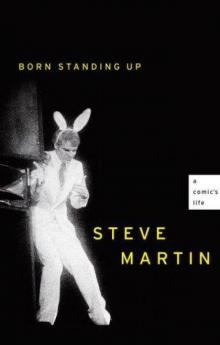 Born Standing Up: A Comic's Life
Born Standing Up: A Comic's Life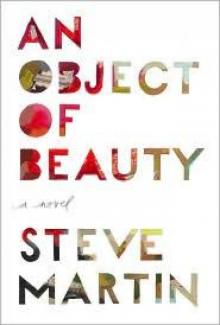 An Object of Beauty
An Object of Beauty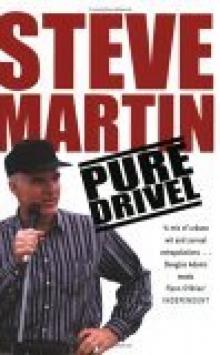 Pure Drivel
Pure Drivel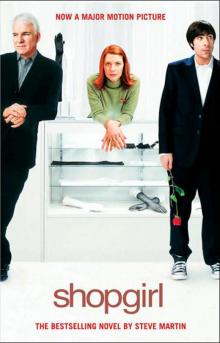 Shopgirl
Shopgirl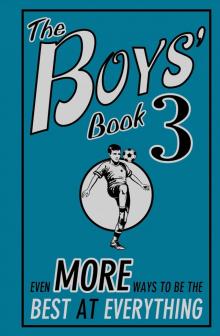 The Boys' Book 3
The Boys' Book 3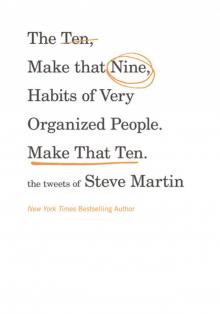 The Ten, Make That Nine, Habits of Very Organized People. Make That Ten.: The Tweets of Steve Martin
The Ten, Make That Nine, Habits of Very Organized People. Make That Ten.: The Tweets of Steve Martin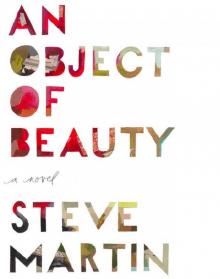 An Object of Beauty: A Novel
An Object of Beauty: A Novel